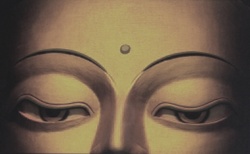Demigod
A demigod (or demi-god), meaning half-god, is originally a Greek mythological figure whose one parent was a god and whose other parent was human; as such, demigods are human-god hybrids. Examples of well-known demigods include the Greek hero Heracles (Roman Hercules), the Celtic hero Cuchulain, the Sumerian king Gilgamesh. Demi-god A being of the demi-god realm, the second highest of the six realms of samsara. Demi-gods are similar to gods but their bodies, possessions, and environments are inferior.
In the Hindu religion, demigod is used to refer to deities who were once human and later became devas (gods) and are worshiped as such. Worship of the demigods is often different from worship of the regular gods such as Lord Ganesha and Lord Shiva.
There are two very notable demigods in Hindu mythology, Hanuman and Garuda, the divine steed of Vishnu. Examples of demigods worshiped in South India are Madurai Veeran and Karuppu Sami.
The heroes of the Hindu epic Mahabharata, the five Pandava brothers, fit the Western definition of demigods, but are generally not referred to as such. Queen Kunti, the wife of King Pandu, was given a mantra that, when recited, meant that one of the Gods would give her his child. When her husband was cursed to die if he ever engaged in sexual relations, Kunti used this mantra to provide her husband with children, Yudishtira (father Yama), Bhima (father Vayu) and Arjuna (father Indra). She taught this mantra to Madri, King Pandu's other wife, and she conceived twin boys, Nakula and Sahadeva (fathers the Asvins). Queen Kunti had previously conceived another son, Karna, when she had tested the mantra out—despite her protests, Surya the sun god was compelled by the mantra to impregnate her.
The Vaishnavites (who often translate deva as "demigod") cite various verses that speak of the devas' subordinate status. For example, the Rig Veda (1.22.20) states, oṃ tad viṣṇoḥ paramam padam sadā paśyanti sūrayaḥ: "All the suras (i.e., the devas) look always toward the feet of Lord Vishnu." Similarly, in the Vishnu Sahasranama the concluding verses state: "The Rishis (great sages), the ancestors, the devas, the great elements, in fact all things moving and unmoving constituting this universe, have originated from Narayana," (i.e., Vishnu). Thus the Devas are stated to be subordinate to Vishnu, or God.
A. C. Bhaktivedanta Swami Prabhupada, the founder of the International Society for Krishna Consciousness (ISKCON) translated the Sanskrit word "deva" as "demigod" in his literature when the term referred to a God other than the Supreme Lord. This is because the ISKCON tradition teaches that there is only one Supreme Lord and that all others are but His servants. In order to emphasize their subservience, Prabhupada the word "demigod" as a translation of deva. However, there are at least three occurrences in the eleventh chapter of Bhagavad-Gita where the word deva is used to refer to Lord Krishna; here Prabhupada translates it as "Lord". The word deva can be used to refer to the Supreme Lord, celestial beings and saintly souls depending on the context. This is similar to the word Bhagavan which is translated according to different contexts.
In the Bhagavad Gita Krishna himself states that worshipers of deities other than the Supreme Lord, Vishnu, are incorrect (Gita 9.23) as such worship leads only to temporal benefits, rather than to the Lord Himself (Gita 7.23). Krishna also says: "Whatever deity or form a devotee worships, I make his faith steady. However, their wishes are granted only by Me." (Gita: 7:21-22) Elsewhere in the Gita Lord Krishna states: "O Arjuna, even those devotees who worship other lesser deities (e.g., devas, for example) with faith, they also worship Me, but in an improper way because I am the Supreme Being. I alone am the enjoyer of all sacrificial services (Seva, Yajna) and Lord of the universe." (Gita: 9:23)
